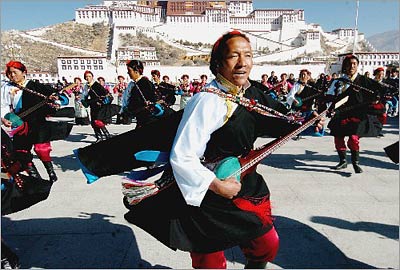Equality, unity, mutual help and common prosperity are the basic
principles of the Chinese government in handling the relations
between ethnic groups. In accordance with these basic principles,
China practices a regional ethnic autonomy system. Where ethnic
minorities live in compact communities, autonomous organs of
self-government are established under the unified leadership of the
state. The minority people exercise autonomous rights, are masters
in their own areas and administer their own internal affairs.
Besides, the state makes great efforts to train ethnic minority
cadres and professional technicians in institutions of higher
learning, and universities, colleges and cadre schools for ethnic
minorities. The Central Government also actively aids the ethnic
autonomous areas with funds and materials so as to promote the
development of the local economies and cultures. The Law on
Regional Ethnic Autonomy adopted in 1984 at the Second Session of
the Sixth NPC is the basic law specifically guaranteeing that the
constitutionally decreed regional ethnic autonomy system is carried
out. Today, in addition to the five autonomous regions (Inner
Mongolia, Xinjiang Uygur, Guangxi Zhuang, Ningxia Hui, and Tibet
autonomous regions), China has 30 autonomous prefectures and 120
autonomous counties (known, in some cases, as "banners"), as well
as over 1,100 ethnic townships. The organs of self-government in
ethnic autonomous areas are the people's congresses and people's
governments of autonomous regions, autonomous prefectures and
autonomous counties (banners). The chairperson or vice-chairpersons
of the standing committee of the people's congress and the head of
an autonomous region, autonomous prefecture or autonomous county
(banner) shall be citizens of the ethnic group exercising regional
autonomy in the area concerned.
 |
Organs of self-government in ethnic autonomous areas enjoy
extensive self-government rights beyond those held by other state
organs at the same level. These include: enacting regulations on
the exercise of autonomy and separate regulations corresponding to
the political, economic and cultural characteristics of the ethnic
group(s) in the areas concerned; having the freedom to manage and
use all revenues accruing to the ethnic autonomous areas;
independently arranging and managing local economic development,
education, science, culture, public health and physical culture,
protecting and sorting out the cultural heritage of the ethnic
groups, and developing and invigorating their cultures.